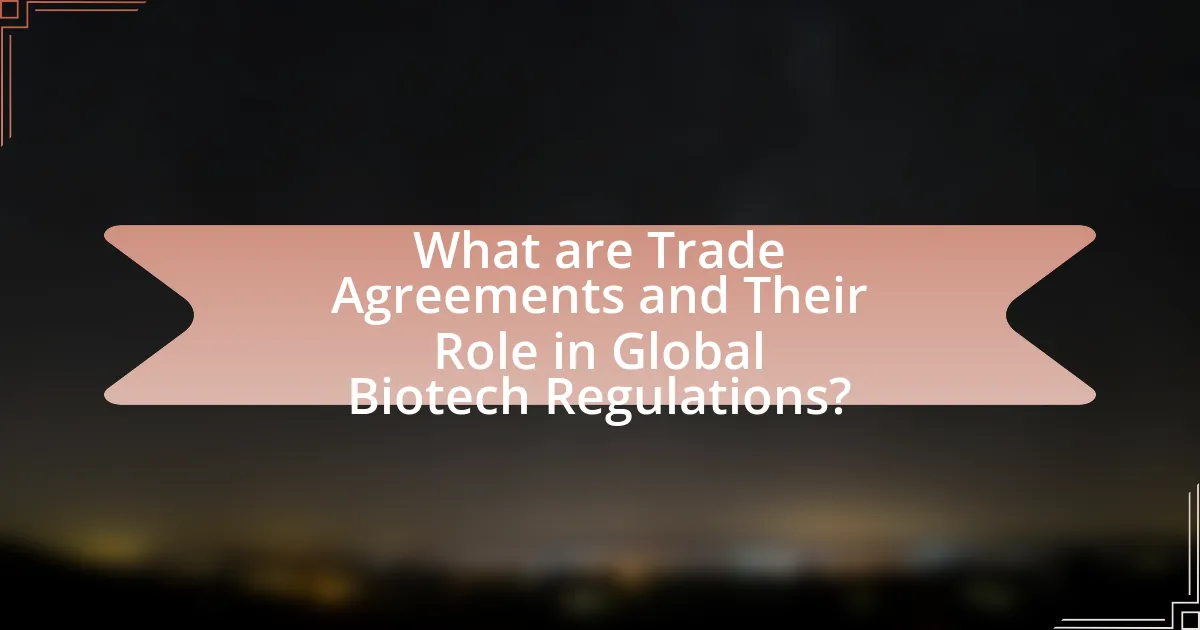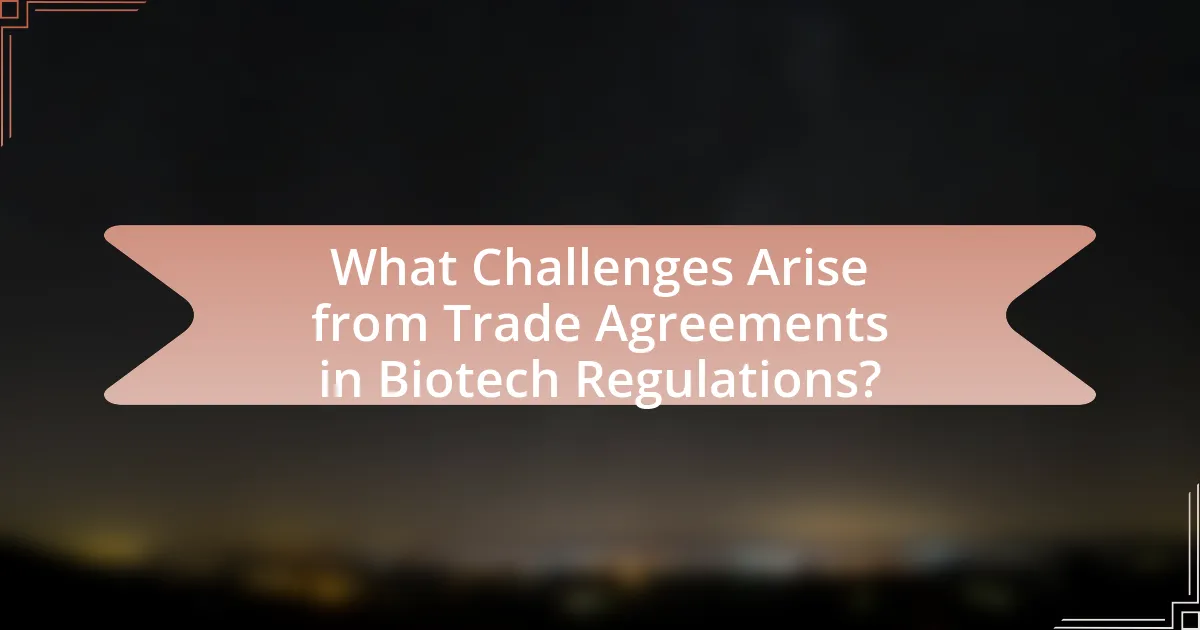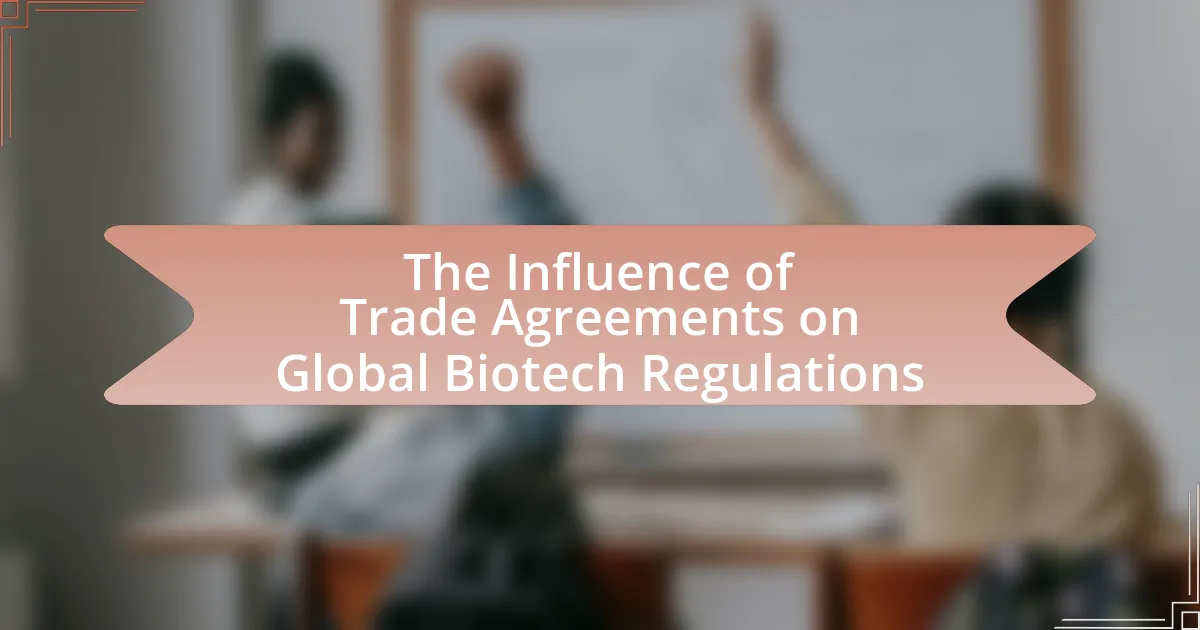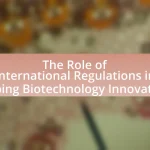Trade agreements are formal arrangements between countries that establish rules for trade and investment, significantly impacting biotechnology regulations. This article examines how trade agreements influence regulatory frameworks in biotechnology, including the harmonization of standards, intellectual property protections, and the facilitation of international collaboration. It discusses the specific regulations affected by these agreements, the challenges they present, and their implications for innovation and public health. Additionally, the article explores future trends in trade agreements and biotechnology regulations, emphasizing the role of emerging technologies and best practices for stakeholders in navigating this complex landscape.

What are Trade Agreements and Their Role in Global Biotech Regulations?
Trade agreements are formal arrangements between countries that establish the rules for trade and investment, including provisions that impact biotechnology regulations. These agreements play a crucial role in harmonizing standards, facilitating cross-border trade of biotech products, and ensuring compliance with safety and ethical guidelines. For instance, the Trans-Pacific Partnership aimed to create a unified regulatory framework for biotech innovations among member countries, promoting collaboration and reducing trade barriers. Such agreements often include intellectual property protections that influence the development and commercialization of biotech products, thereby shaping the global landscape of biotechnology regulation.
How do trade agreements influence regulatory frameworks in biotechnology?
Trade agreements significantly influence regulatory frameworks in biotechnology by establishing common standards and harmonizing regulations among member countries. These agreements often include provisions that facilitate the trade of biotechnological products, which can lead to the adoption of similar regulatory practices to ensure compliance and reduce barriers. For instance, the Trans-Pacific Partnership (TPP) aimed to create a unified regulatory environment for biotechnology, promoting the acceptance of genetically modified organisms (GMOs) across member nations. This harmonization can streamline approval processes and enhance market access for biotech products, ultimately shaping national regulations to align with international standards.
What specific regulations are affected by trade agreements in the biotech sector?
Trade agreements in the biotech sector specifically affect regulations related to intellectual property rights, product safety and efficacy standards, and environmental regulations. These agreements often harmonize patent laws, which can extend patent protections for biotech innovations, thereby influencing research and development investments. For instance, the Trans-Pacific Partnership aimed to standardize intellectual property protections across member countries, impacting how biotech companies protect their innovations. Additionally, trade agreements can streamline regulatory processes for product approvals, such as those for genetically modified organisms, by establishing mutual recognition of safety assessments, which can expedite market access.
How do trade agreements facilitate or hinder biotech innovation?
Trade agreements facilitate biotech innovation by providing a framework for intellectual property protection, which incentivizes research and development. For instance, agreements like the Trade-Related Aspects of Intellectual Property Rights (TRIPS) establish minimum standards for patent protection, encouraging companies to invest in biotech innovations. Conversely, trade agreements can hinder innovation if they impose stringent regulations that limit access to essential technologies or create barriers for smaller firms. An example is the European Union’s regulations on genetically modified organisms (GMOs), which can restrict market entry for biotech products, thereby stifling innovation.
Why are trade agreements important for international biotech collaboration?
Trade agreements are crucial for international biotech collaboration as they establish a framework for cooperation, reduce trade barriers, and facilitate the exchange of knowledge and resources. These agreements often include provisions that protect intellectual property rights, which is vital for biotech companies that rely on innovation and research. For instance, the Trans-Pacific Partnership aimed to harmonize regulations across member countries, thereby enhancing collaboration in biotech research and development. By creating a more predictable regulatory environment, trade agreements encourage investment and partnerships, ultimately leading to advancements in biotechnology that can address global health challenges.
What are the key benefits of harmonizing biotech regulations through trade agreements?
Harmonizing biotech regulations through trade agreements offers several key benefits, including increased market access, reduced compliance costs, and enhanced innovation. By aligning regulations, countries can facilitate smoother trade flows, allowing biotech products to reach markets more efficiently. This alignment minimizes the need for duplicative testing and regulatory approvals, which can significantly lower costs for companies operating in multiple jurisdictions. Furthermore, harmonization fosters a collaborative environment that encourages research and development, as companies can share knowledge and resources across borders. For instance, the Trans-Pacific Partnership aimed to create a unified regulatory framework that would streamline processes for biotech products, demonstrating the potential for enhanced trade and innovation through regulatory harmonization.
How do trade agreements impact the sharing of biotech research and development?
Trade agreements significantly enhance the sharing of biotech research and development by establishing frameworks that facilitate collaboration and reduce barriers. These agreements often include provisions for intellectual property rights, which can protect innovations while encouraging partnerships between countries. For instance, the Trans-Pacific Partnership aimed to harmonize regulations and promote joint research initiatives among member countries, thereby fostering a more integrated biotech ecosystem. Additionally, trade agreements can streamline regulatory processes, making it easier for biotech firms to access international markets and share their findings. This collaborative environment is supported by data showing that countries engaged in trade agreements tend to increase their joint research outputs, as evidenced by a study published in the Journal of Biotechnology, which found that international collaborations in biotech rose by 30% in regions with active trade agreements.

What Challenges Arise from Trade Agreements in Biotech Regulations?
Trade agreements in biotech regulations present challenges such as regulatory divergence, intellectual property conflicts, and compliance costs. Regulatory divergence occurs when countries adopt different standards for biotech products, complicating international trade and market access. For instance, the European Union’s stringent regulations on genetically modified organisms (GMOs) contrast sharply with more lenient U.S. policies, creating barriers for companies seeking to operate in both markets. Intellectual property conflicts arise when trade agreements enforce patent protections that may hinder innovation or access to essential biotech advancements, as seen in debates over access to life-saving medications. Additionally, compliance costs increase for biotech firms that must navigate varying regulations across jurisdictions, which can stifle smaller companies’ ability to compete. These challenges highlight the complexities trade agreements introduce into the biotech sector, impacting innovation and global collaboration.
What are the potential conflicts between national regulations and trade agreements?
Potential conflicts between national regulations and trade agreements arise when domestic laws prioritize local standards over international commitments. For instance, a country may enforce stricter safety regulations for biotech products that contradict the more lenient standards established in a trade agreement. This can lead to disputes, as seen in cases like the U.S.-Mexico-Canada Agreement, where differing agricultural biotechnology regulations created tension among member countries. Additionally, national regulations may aim to protect public health or the environment, which can conflict with trade agreements that promote free trade and reduce barriers. Such conflicts necessitate careful negotiation and alignment to ensure compliance with both national interests and international obligations.
How can differing regulatory standards affect global biotech companies?
Differing regulatory standards can significantly impact global biotech companies by creating barriers to market entry and increasing compliance costs. For instance, when a biotech company seeks to operate in multiple countries, it must navigate varying approval processes, which can lead to delays in product launches. According to a report by the Biotechnology Innovation Organization, the average time for regulatory approval can vary from 12 months in some regions to over 5 years in others, affecting the overall competitiveness of companies. Additionally, inconsistent standards can lead to increased research and development costs, as companies may need to adapt their products to meet different regulatory requirements in each market. This complexity can hinder innovation and limit access to new therapies for patients globally.
What are the implications of trade disputes on biotech regulations?
Trade disputes can significantly impact biotech regulations by creating uncertainty and leading to regulatory divergence among countries. When nations engage in trade disputes, they may impose tariffs or restrictions that affect the import and export of biotech products, prompting regulatory bodies to adapt their frameworks to protect domestic industries. For instance, the U.S.-China trade tensions have led to increased scrutiny of biotech products, as both countries seek to safeguard their intellectual property and market access. This situation can result in a fragmented regulatory landscape, where differing standards and requirements complicate international trade and collaboration in biotech research and development.
How do trade agreements address ethical concerns in biotechnology?
Trade agreements address ethical concerns in biotechnology by incorporating provisions that promote transparency, safety standards, and ethical practices in biotechnological research and development. For instance, agreements like the Trans-Pacific Partnership (TPP) include clauses that require member countries to adhere to internationally recognized ethical guidelines, such as those set by the World Health Organization and the Organisation for Economic Co-operation and Development. These provisions aim to ensure that biotechnological innovations do not compromise public health or environmental safety, thereby fostering responsible use of biotechnology. Additionally, trade agreements often facilitate collaboration among countries to share best practices and regulatory frameworks, which can enhance ethical oversight in biotechnology.
What role do trade agreements play in regulating genetically modified organisms (GMOs)?
Trade agreements play a crucial role in regulating genetically modified organisms (GMOs) by establishing international standards and guidelines that member countries must adhere to. These agreements often include provisions that facilitate trade in GMOs while ensuring safety assessments and labeling requirements are met, thereby influencing national regulations. For instance, the World Trade Organization’s Agreement on the Application of Sanitary and Phytosanitary Measures requires countries to base their regulations on scientific evidence, which impacts how GMOs are evaluated and approved globally. Additionally, trade agreements can create a framework for dispute resolution regarding GMO regulations, promoting consistency and reducing trade barriers among participating nations.
How are public health and safety considered in trade agreements related to biotech?
Public health and safety are integral components of trade agreements related to biotech, as these agreements often include provisions that ensure the safety and efficacy of biotechnological products. For instance, the World Trade Organization’s Agreement on the Application of Sanitary and Phytosanitary Measures mandates that member countries establish health standards based on scientific evidence, thereby prioritizing public health in trade practices. Additionally, trade agreements may require risk assessments and regulatory harmonization to facilitate safe cross-border trade of biotech products, ensuring that public health considerations are systematically integrated into the regulatory framework.

What Future Trends Can We Expect in Trade Agreements and Biotech Regulations?
Future trends in trade agreements and biotech regulations will likely focus on increased harmonization of standards and greater emphasis on sustainability. As countries seek to facilitate international trade, they are expected to align their regulatory frameworks to reduce barriers, which can enhance the global movement of biotech products. For instance, the Comprehensive and Progressive Agreement for Trans-Pacific Partnership (CPTPP) has provisions that encourage member countries to adopt consistent regulatory practices, which can serve as a model for future agreements. Additionally, the growing public concern over environmental issues is pushing for regulations that prioritize sustainable biotech practices, as seen in the European Union’s Green Deal, which aims to integrate sustainability into trade policies. These trends indicate a shift towards more collaborative and environmentally conscious approaches in the regulation of biotechnology within trade agreements.
How might emerging technologies influence future trade agreements in biotechnology?
Emerging technologies will significantly influence future trade agreements in biotechnology by enabling more efficient data sharing, enhancing regulatory compliance, and fostering innovation. For instance, advancements in artificial intelligence and blockchain can streamline the approval processes for biotech products, allowing for quicker market access and reducing bureaucratic delays. Additionally, technologies like CRISPR and synthetic biology may necessitate new regulatory frameworks that address ethical concerns and safety standards, prompting countries to negotiate agreements that reflect these innovations. The World Trade Organization has noted that technological advancements can reshape trade dynamics, emphasizing the need for adaptive regulatory approaches that accommodate rapid developments in biotechnology.
What are the implications of digital health innovations on biotech regulations?
Digital health innovations significantly impact biotech regulations by necessitating updates to existing frameworks to accommodate new technologies. These innovations, such as telemedicine and wearable health devices, challenge traditional regulatory approaches, prompting agencies like the FDA to adapt their guidelines for software as a medical device (SaMD) and data privacy. For instance, the FDA’s Digital Health Innovation Action Plan aims to streamline the regulatory process for digital health products, reflecting the need for a more agile regulatory environment that can keep pace with rapid technological advancements. This evolution in regulations ensures that safety and efficacy standards are maintained while fostering innovation in the biotech sector.
How could artificial intelligence impact regulatory compliance in biotech?
Artificial intelligence could significantly enhance regulatory compliance in biotech by automating data analysis and improving decision-making processes. AI systems can analyze vast amounts of regulatory data, identify compliance risks, and ensure adherence to evolving regulations more efficiently than traditional methods. For instance, AI algorithms can monitor changes in regulations across different jurisdictions, allowing biotech companies to adapt their practices proactively. Additionally, AI can facilitate real-time reporting and documentation, reducing the likelihood of human error and ensuring that compliance records are accurate and up-to-date. This capability is crucial in an industry where regulatory requirements are stringent and constantly changing, as evidenced by the increasing complexity of regulations outlined by organizations such as the FDA and EMA.
What best practices can stakeholders adopt to navigate trade agreements effectively?
Stakeholders can adopt several best practices to navigate trade agreements effectively, including thorough research, proactive engagement, and strategic collaboration. Conducting comprehensive research on existing trade agreements and their implications for biotech regulations allows stakeholders to understand the legal landscape and identify opportunities or challenges. Proactive engagement with policymakers and industry groups facilitates communication and advocacy, ensuring that stakeholders’ interests are represented in negotiations. Additionally, strategic collaboration among stakeholders, such as forming coalitions or partnerships, can amplify their influence and provide a unified voice in discussions related to trade agreements. These practices are supported by the fact that successful navigation of trade agreements often hinges on informed participation and collective action, as evidenced by the collaborative efforts seen in various international trade negotiations.
How can biotech companies prepare for changes in trade regulations?
Biotech companies can prepare for changes in trade regulations by conducting thorough risk assessments and staying informed about potential regulatory shifts. This proactive approach allows companies to identify vulnerabilities in their supply chains and adapt their compliance strategies accordingly. For instance, the Biotechnology Innovation Organization (BIO) emphasizes the importance of monitoring international trade agreements and engaging with policymakers to advocate for favorable terms that support innovation and market access. By participating in industry coalitions and utilizing legal expertise, biotech firms can better navigate the complexities of evolving trade landscapes, ensuring they remain competitive and compliant.
What strategies can governments employ to balance trade and regulatory needs in biotechnology?
Governments can employ strategies such as harmonizing regulations with international standards, fostering public-private partnerships, and implementing adaptive regulatory frameworks to balance trade and regulatory needs in biotechnology. Harmonizing regulations with international standards, such as those set by the World Health Organization or the Codex Alimentarius, can facilitate trade by ensuring that products meet globally accepted safety and efficacy benchmarks. Public-private partnerships can enhance innovation while ensuring compliance with regulatory requirements, as seen in initiatives like the FDA’s collaboration with biotech firms to streamline the approval process for new therapies. Adaptive regulatory frameworks allow for flexibility in response to rapid advancements in biotechnology, enabling governments to adjust regulations without stifling innovation or trade. These strategies collectively support a balanced approach that promotes both trade and regulatory compliance in the biotechnology sector.


